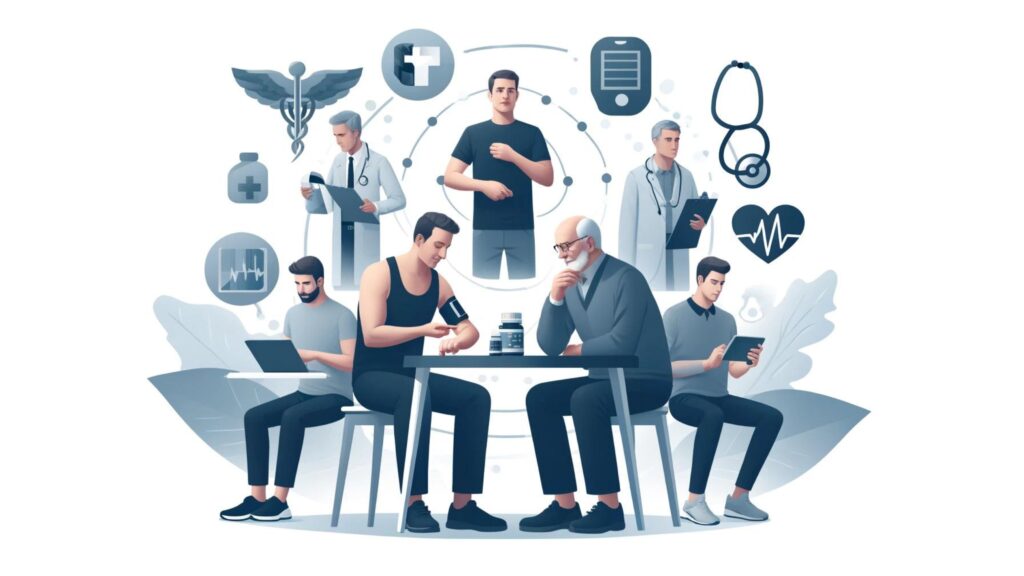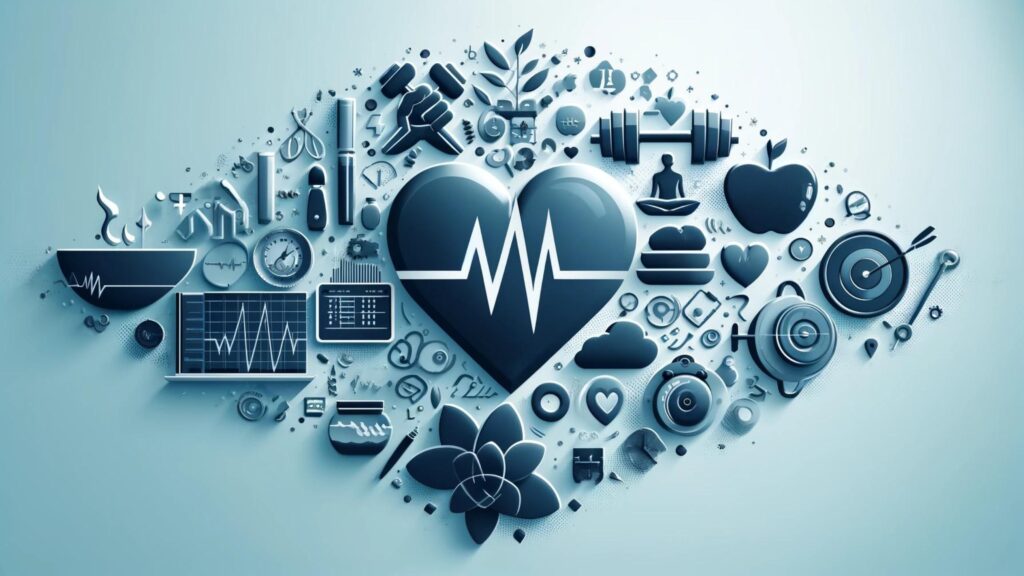Imagine discovering a cache of hidden truths that could transform your approach to men’s health. What if you could unlock the most profound secrets—those transformative nuggets of wisdom that have eluded even the most dedicated health enthusiasts? This isn’t just another exercise routine or diet plan. It’s about revealing the best ultimate secrets you’ve never heard before—ones that will inspire you to take action and change your life. We invite you to explore the world of men’s health, where each revelation promises not only better health but also a renewed zest for life. Are you ready to explore the unknown and reshape your health destiny? Let us embark on this journey together.
- An Introduction to Men's Health
- What is men's health? Unpacking the basics
- Why We Often Neglect Men's Health: A Cultural Perspective
- The Value of Men's Health Awareness
- Men's Health Statistics: What You Should Know
- Decoding men's health terms and definitions
- Setting the stage for men's health excellence
- Every Man Should Know Important Aspects of Men's Health
- Common misconceptions about men's health
- Over Decades: The Evolution of Men's Health
- Men's Health: A Priority for Society
- Men's Health and Physical Wellness
- Top Tips for Men's Fitness
- Men's Health at Home: Exercises to Do Anywhere
- Myths about Men's Health and Weightlifting: Tips and Advice
- Cardiovascular and male health
- Men's Health and Flexibility: Important Stretches
- Outdoor Activities That Improve Men's Health
- Men's Health in Sports: Preventing Injury
- Daily Men's Health and Fitness Routine
- Advanced Men's Health Workout Plans
- Tracking Fitness Progress in Men's Health
- Nutrition and men's health
- Key Nutrients for Men's Health
- Men's Health Diet: What to Eat?
- Men's Health and Carbohydrates: Proper Sources
- Proteins and Men’s Health: Building Blocks of Muscle
- Men's health and fats: the good and bad
- Men's Health Supplements: What Works?
- Water Intake Guidelines: Hydration and Men's Health
- Men's Health and Alcohol: Effects on the Body
- Plan meals for optimal men's health.
- Men's Health and Eating Disorders
- Men's Health and Mental Wellbeing
- Stress and Men's Health: Managing Modern Pressures
- Men's Health and Anxiety: Overcoming Common Challenges
- Depression and Men's Health: Recognizing Signs
- Men's Health and Sleep: Maximising Rest
- Men's Health: Work-Life Balance
- Mental exercises to improve men's health
- Men's Wellness and Mindfulness Practices
- Men's health treatment and counseling
- Men's Health: Dealing With Emotional Trauma
- Men's Relationship Health: Emotional Bonding
- Preventive Care for Men's Health
- Men's Health Screenings: Why They Matter
- Men's health and scheduled doctor visits
- Men's Health: Understanding Blood Tests
- Vaccines and Men's Health: Required Shots
- Men's health and cancer prevention
- Men's Health and Heart Disease: Risk Reduction
- Men's Health and Diabetes Prevention Tips
- Men's health and bone density
- Men's Health in Aging: What Changes?
- Every man should be knowledgeable about first aid.
- Men's Health and Lifestyle Options
- Men's Health and Smoking: Quit Tips
- Men's Health, Recreational Drugs
- Men's Health: Healthy Habits
- Men's Health and Hygiene
- Men's Health in the Digital Era: Managing Screen Time
- Men's Health and Travel: Staying Healthy on the Move
- Men's Health and Holidays: Staying Fit
- Men's Health and Hobbies: Useful Activities
- Men's Health at Work: Ergonomic Practices
- Men's Health and Retirement Plans
- Men's Health: Chronic Conditions
- Men's Health: Managing Chronic Pain
- Men's Health and Arthritis Treatment Options
- Men's health and asthma: breathing techniques
- Men's Health and Skin Condition
- Men's Health and Allergies: Avoidance Strategies
- Men's Health and Digestive Issues
- Men's Health and Eye Care
- Men's Health and Hearing Loss
- Men's Health: Migraine Relief Tips
- Men's and Urologic Health
- Men's sexual and reproductive health
- Men’s Health and Sexual Performance
- Men's and prostate health
- Men's health and testosterone levels
- Men's Health and Fertility Issues
- Men's Health and Safe Sexual Practices
- Men's Health and STI Prevention
- Men's Health and Intimacy Issues
- Male and Aging: Sexual Health in Later Life
- Men's Health: Erectile Dysfunction
- Men's health and contraception options
- Men's Health: Innovations and Technology
- Men's Health, Wearable Technology
- What Are the Benefits of Men's Health Apps?
- Men's Health Online Resources
- Men's Health and Telemedicine
- Men's Health, Genetic Testing
- Men's health and AI advancements
- Men's health and VR training
- Men's Health and Data Privacy
- Men's health and future medical technology
- Men's Health and Community Platforms
- Men's Health: Global Perspectives
- Men's Health in the World: A Comparative Analysis
- Men's Health: Cultural Influences
- Men’s Health and Global Epidemics
- Men's Health and International Healthcare System
- Men's Health and Global Nutrition Trends
- Men's Health and World Fitness Practices
- Men's health and cross-cultural medical practice
- Men's health and global public health policies are important topics.
- Men's Health: Global Advocacy Efforts
- Men's Health & International Men's Day
- The Best Ultimate Secrets You've Never Heard: A Guide to Men's Health
- Frequently Asked Questions: Men's Health—Revealing the Best Ultimate Secrets
- Conclusion

An Introduction to Men’s Health
What is men’s health? Unpacking the basics
Men’s health refers to a comprehensive approach to men’s physical, mental, and emotional well-being, which includes a wide range of gender-specific and general health concerns. It goes beyond disease prevention, aiming to improve well-being through proactive strategies and personalized health education.
Why We Often Neglect Men’s Health: A Cultural Perspective
Historically, societal norms have positioned men as stoic figures, less likely to show vulnerability or seek medical attention. This cultural posture frequently leads to significant delays in health interventions and an underestimation of mental health issues, making it critical to challenge these outdated perceptions in order to protect men’s health.
The Value of Men’s Health Awareness
Raising awareness about men’s health is critical to overcoming the stigma that prevents men from seeking timely medical care. By promoting health literacy and awareness, society can encourage preventative health practices that can significantly reduce the prevalence of chronic diseases in men.
Men’s Health Statistics: What You Should Know
Alarming trends emerge from statistical data: men are more likely to develop lifestyle-related health conditions, such as cardiovascular disease and diabetes, and they have a higher mortality rate for the majority of leading causes of death. These statistics highlight the critical need for targeted health strategies tailored specifically to men.
Decoding men’s health terms and definitions
Understanding terms such as “andropause,” “prostate health,” and “testosterone deficiency” is critical in the field of men’s health. Each term addresses a different aspect of men’s physiological and psychological well-being, contributing to a lexicon necessary for effectively discussing and addressing men’s health issues.
Setting the stage for men’s health excellence
Integrating comprehensive health services that not only treat but also educate, empower, and encourage men to take an active role in their health management is necessary to achieve excellence in men’s health. This includes creating supportive environments that respect and address men’s health needs.
Every Man Should Know Important Aspects of Men’s Health
Every man should be knowledgeable about several key areas, including the importance of regular check-ups, understanding and managing mental health, nutritional requirements, and the role of physical fitness. Knowledge in these areas is the foundation of a healthy lifestyle.
Common misconceptions about men’s health
Misconceptions such as “real men don’t cry” and “men don’t suffer from depression” continue to pervade the discourse, preventing people from seeking health care. Debunking these myths is critical to creating a more health-conscious and informed male population.
Over Decades: The Evolution of Men’s Health
Men’s health has evolved over the decades, from a narrow focus on reproductive issues to a more comprehensive understanding that includes mental health and chronic disease prevention. This evolution reflects a growing understanding of men’s complex health needs throughout their lives.
Men’s Health: A Priority for Society
Making men’s health a societal priority not only improves their quality of life, but it also has far-reaching implications for families and communities. Investing in men’s health leads to more productive societies and lowers healthcare costs associated with treating preventable diseases.

Men’s Health and Physical Wellness
Top Tips for Men’s Fitness
Optimizing your gym routine is critical to men’s health. To avoid injuries, begin with a dynamic warm-up, incorporate a mix of strength training and cardio, and prioritize form over weight to maximize effectiveness and reduce risk.
Men’s Health at Home: Exercises to Do Anywhere
To be effective, home workouts do not have to be complex or require a lot of equipment. Simple bodyweight exercises such as push-ups, sit-ups, planks, and squats can significantly improve one’s physical health and are easily modified to increase difficulty as fitness improves.
Myths about Men’s Health and Weightlifting: Tips and Advice
Contrary to popular belief, weightlifting is more than just bulking up. It’s an essential part of maintaining muscle mass, increasing bone density, and increasing metabolism. Tips for effective weightlifting include focusing on compound movements and allowing enough time between sessions to recover.
Cardiovascular and male health
Cardiovascular exercise is more than just an endurance activity; it is essential for maintaining heart health. Regular cardiovascular exercise helps to lower the risk of heart disease by improving blood circulation, lowering blood pressure, and increasing heart function.
Men’s Health and Flexibility: Important Stretches
Men’s fitness regimens often overlook flexibility, despite its critical role in overall health and injury prevention. Use key stretches to target major muscle groups, enhance mobility, and maintain muscle health before and after workouts.
Outdoor Activities That Improve Men’s Health
Outdoor activities such as hiking, cycling, and swimming improve both physical and mental health. Natural scenery and fresh air help to reduce stress and improve overall well-being.
Men’s Health in Sports: Preventing Injury
Sports can be physically demanding, which makes injury prevention critical. Staying safe requires adequate training, the use of appropriate equipment, and proper techniques. Regular strength and flexibility training can also help the body prepare for the demands of sports.
Daily Men’s Health and Fitness Routine
A daily routine should include at least 30 minutes of moderate-to-vigorous activity. This routine can include a variety of cardiovascular exercises, strength training, and flexibility workouts to address all aspects of physical health.
Advanced Men’s Health Workout Plans
Advanced workout plans can include high-intensity interval training (HIIT), progressive overload in weightlifting, and specialized regimens like plyometrics or speed drills to improve athletic performance.
Tracking Fitness Progress in Men’s Health
Monitoring progress is critical for maintaining motivation and effectiveness in any fitness program. Fitness apps, wearable technology, and regular fitness assessments can all help track progress in endurance, strength, flexibility, and overall physical health.

Nutrition and men’s health
Key Nutrients for Men’s Health
A healthy diet for men should include a variety of nutrients, such as protein, fats, carbohydrates, vitamins, and minerals. These nutrients promote muscle growth, energy, cognitive function, and cellular health.
Men’s Health Diet: What to Eat?
A men’s health diet should include whole, nutrient-dense foods. Include a variety of fruits, vegetables, lean proteins, whole grains, and healthy fats in your daily meals to ensure a balanced intake of essential vitamins and minerals.
Men’s Health and Carbohydrates: Proper Sources
Carbohydrates are necessary for energy, but the source matters. To maintain energy levels and support metabolic health, men should consume complex carbohydrates like whole grains, legumes, and vegetables rather than simple sugars.
Proteins and Men’s Health: Building Blocks of Muscle
Proteins are muscle’s structural components and are essential for repair and growth. Lean meats, fish, poultry, and plant-based options such as beans and lentils are all important for maintaining muscle mass and overall health.
Men’s health and fats: the good and bad
Not all fats are created equally. Avoid trans and saturated fats, and consume monounsaturated and polyunsaturated fats from avocados, nuts, seeds, and fish for heart health and brain function.
Men’s Health Supplements: What Works?
While a healthy diet is essential, certain supplements can be useful. Supplements containing omega-3 fatty acids, vitamin D, magnesium, and protein can help men fill nutritional gaps and improve their health.
Water Intake Guidelines: Hydration and Men’s Health
Proper hydration is essential for good health. Men should consume at least 3.7 liters (125 ounces) of water per day to support cellular function, digestion, and detoxification.
Men’s Health and Alcohol: Effects on the Body
Moderation is essential when it comes to alcohol. Excessive drinking can cause liver disease, impaired cognitive function, and other health problems. Limiting alcohol consumption can significantly improve men’s health.
Plan meals for optimal men’s health.
Meal planning can help men maintain a healthy diet. Planning meals around protein sources, including a variety of vegetables, and incorporating healthy fats can help you maintain your health more easily and effectively.
Men’s Health and Eating Disorders
Eating disorders do not just affect women; they also have a significant impact on men’s health. Recognizing the symptoms of an eating disorder and understanding the significance of seeking help is critical for recovery and overall health.

Men’s Health and Mental Wellbeing
Stress and Men’s Health: Managing Modern Pressures
In today’s high-stress environment, stress management is critical for overall health. Time management, regular physical activity, and relaxation techniques such as deep breathing can all help to reduce the impact of stress on men’s health.
Men’s Health and Anxiety: Overcoming Common Challenges
Anxiety can be debilitating, but understanding its causes and symptoms can help men seek effective treatment. Studies have shown that cognitive-behavioral therapy (CBT) and lifestyle changes can effectively reduce anxiety and enhance overall well-being.
Depression and Men’s Health: Recognizing Signs
The first step toward treatment is to recognize the symptoms of depression, which include persistent sadness, a loss of interest in favorite activities, and fatigue. We encourage men to overcome the stigma and seek professional help to effectively manage their symptoms.
Men’s Health and Sleep: Maximising Rest
Quality sleep is essential for good health. Establishing a regular sleep schedule, optimizing the sleep environment, and avoiding stimulants before bedtime can all help to improve sleep quality, which in turn improves overall health.
Men’s Health: Work-Life Balance
Achieving a positive work-life balance is critical for mental health. Prioritizing personal activities and family time can help reduce work-related stress while also improving overall happiness and health.
Mental exercises to improve men’s health
Mental exercises such as puzzles, reading, and strategic games can help to strengthen cognitive functions and delay the onset of mental decline. Regular mental stimulation is just as important as physical activity in maintaining health.
Men’s Wellness and Mindfulness Practices
Mindfulness practices such as meditation, yoga, and tai chi can significantly reduce stress and anxiety. Studies have demonstrated the benefits of these practices on both emotional and physical health, as they foster present-moment awareness.
Men’s health treatment and counseling
Therapy and counseling are invaluable tools for dealing with various mental health issues. These services offer men a safe space to express their emotions and work through mental health issues with professional help.
Men’s Health: Dealing With Emotional Trauma
Dealing with emotional trauma necessitates an understanding of its profound impact on mental health. Trauma-informed therapy, support groups, and personal reflection are all important tools for healing.
Men’s Relationship Health: Emotional Bonding
Emotional bonding in relationships heavily influences men’s mental health. Open communication, vulnerability, and mutual support are critical for developing strong, healthy relationships that improve overall well-being.

Preventive Care for Men’s Health
Men’s Health Screenings: Why They Matter
Regular health screenings are essential for the early detection of diseases that commonly affect men, such as prostate cancer, colon cancer, and heart disease. These screenings can lead to earlier interventions, significantly improving the prognosis and health outcomes.
Men’s health and scheduled doctor visits
Regular visits to a healthcare provider are essential for maintaining good health. These visits enable the monitoring of existing health conditions, the identification of risk factors for new conditions, and discussions about lifestyle changes that promote long-term well-being.
Men’s Health: Understanding Blood Tests
Blood tests are important in preventive health care because they provide information about cholesterol levels, liver function, glucose levels, and other factors. Understanding these findings can assist men in making informed choices about diet, exercise, and medications.
Vaccines and Men’s Health: Required Shots
Vaccines are an important part of preventive care because they protect against diseases like flu, tetanus, hepatitis B, and shingles. Staying up-to-date on vaccinations is critical for maintaining health, especially as immune defenses naturally decline with age.
Men’s health and cancer prevention
Lifestyle changes, such as quitting smoking, reducing alcohol consumption, eating a healthy diet, and engaging in regular physical activity, are all cancer prevention strategies. Regular screenings for colorectal and prostate cancer are also essential.
Men’s Health and Heart Disease: Risk Reduction
Men should maintain a healthy weight, manage blood pressure, control cholesterol levels, limit their consumption of saturated fats, and engage in regular physical activity to reduce their risk of heart disease.
Men’s Health and Diabetes Prevention Tips
Diabetes prevention entails maintaining a healthy weight through diet and exercise, monitoring blood glucose levels, and scheduling regular health checkups. Lifestyle changes can significantly lower your risk of developing type 2 diabetes.
Men’s health and bone density
Maintaining bone density is especially important as men age. Adequate calcium and vitamin D intake, combined with weight-bearing exercise, can help prevent osteoporosis and lower the risk of fracture.
Men’s Health in Aging: What Changes?
Men’s metabolism, hormone levels, and muscle mass can all change as they age. Understanding these changes is critical for adapting lifestyle habits to maintain health and vitality into the senior years.
Every man should be knowledgeable about first aid.
Basic first-aid knowledge is required for dealing with common injuries and emergencies. To respond effectively to health emergencies, men should be familiar with techniques such as CPR, wound care, and proper fracture or sprain treatment.
- An Introduction to Men's Health
- What is men's health? Unpacking the basics
- Why We Often Neglect Men's Health: A Cultural Perspective
- The Value of Men's Health Awareness
- Men's Health Statistics: What You Should Know
- Decoding men's health terms and definitions
- Setting the stage for men's health excellence
- Every Man Should Know Important Aspects of Men's Health
- Common misconceptions about men's health
- Over Decades: The Evolution of Men's Health
- Men's Health: A Priority for Society
- Men's Health and Physical Wellness
- Top Tips for Men's Fitness
- Men's Health at Home: Exercises to Do Anywhere
- Myths about Men's Health and Weightlifting: Tips and Advice
- Cardiovascular and male health
- Men's Health and Flexibility: Important Stretches
- Outdoor Activities That Improve Men's Health
- Men's Health in Sports: Preventing Injury
- Daily Men's Health and Fitness Routine
- Advanced Men's Health Workout Plans
- Tracking Fitness Progress in Men's Health
- Nutrition and men's health
- Key Nutrients for Men's Health
- Men's Health Diet: What to Eat?
- Men's Health and Carbohydrates: Proper Sources
- Proteins and Men’s Health: Building Blocks of Muscle
- Men's health and fats: the good and bad
- Men's Health Supplements: What Works?
- Water Intake Guidelines: Hydration and Men's Health
- Men's Health and Alcohol: Effects on the Body
- Plan meals for optimal men's health.
- Men's Health and Eating Disorders
- Men's Health and Mental Wellbeing
- Stress and Men's Health: Managing Modern Pressures
- Men's Health and Anxiety: Overcoming Common Challenges
- Depression and Men's Health: Recognizing Signs
- Men's Health and Sleep: Maximising Rest
- Men's Health: Work-Life Balance
- Mental exercises to improve men's health
- Men's Wellness and Mindfulness Practices
- Men's health treatment and counseling
- Men's Health: Dealing With Emotional Trauma
- Men's Relationship Health: Emotional Bonding
- Preventive Care for Men's Health
- Men's Health Screenings: Why They Matter
- Men's health and scheduled doctor visits
- Men's Health: Understanding Blood Tests
- Vaccines and Men's Health: Required Shots
- Men's health and cancer prevention
- Men's Health and Heart Disease: Risk Reduction
- Men's Health and Diabetes Prevention Tips
- Men's health and bone density
- Men's Health in Aging: What Changes?
- Every man should be knowledgeable about first aid.
- Men's Health and Lifestyle Options
- Men's Health and Smoking: Quit Tips
- Men's Health, Recreational Drugs
- Men's Health: Healthy Habits
- Men's Health and Hygiene
- Men's Health in the Digital Era: Managing Screen Time
- Men's Health and Travel: Staying Healthy on the Move
- Men's Health and Holidays: Staying Fit
- Men's Health and Hobbies: Useful Activities
- Men's Health at Work: Ergonomic Practices
- Men's Health and Retirement Plans
- Men's Health: Chronic Conditions
- Men's Health: Managing Chronic Pain
- Men's Health and Arthritis Treatment Options
- Men's health and asthma: breathing techniques
- Men's Health and Skin Condition
- Men's Health and Allergies: Avoidance Strategies
- Men's Health and Digestive Issues
- Men's Health and Eye Care
- Men's Health and Hearing Loss
- Men's Health: Migraine Relief Tips
- Men's and Urologic Health
- Men's sexual and reproductive health
- Men’s Health and Sexual Performance
- Men's and prostate health
- Men's health and testosterone levels
- Men's Health and Fertility Issues
- Men's Health and Safe Sexual Practices
- Men's Health and STI Prevention
- Men's Health and Intimacy Issues
- Male and Aging: Sexual Health in Later Life
- Men's Health: Erectile Dysfunction
- Men's health and contraception options
- Men's Health: Innovations and Technology
- Men's Health, Wearable Technology
- What Are the Benefits of Men's Health Apps?
- Men's Health Online Resources
- Men's Health and Telemedicine
- Men's Health, Genetic Testing
- Men's health and AI advancements
- Men's health and VR training
- Men's Health and Data Privacy
- Men's health and future medical technology
- Men's Health and Community Platforms
- Men's Health: Global Perspectives
- Men's Health in the World: A Comparative Analysis
- Men's Health: Cultural Influences
- Men’s Health and Global Epidemics
- Men's Health and International Healthcare System
- Men's Health and Global Nutrition Trends
- Men's Health and World Fitness Practices
- Men's health and cross-cultural medical practice
- Men's health and global public health policies are important topics.
- Men's Health: Global Advocacy Efforts
- Men's Health & International Men's Day
- The Best Ultimate Secrets You've Never Heard: A Guide to Men's Health
- Frequently Asked Questions: Men's Health—Revealing the Best Ultimate Secrets
- Conclusion

Men’s Health and Lifestyle Options
Men’s Health and Smoking: Quit Tips
Quitting smoking is one of the best decisions a man can make for his health. Strategies such as nicotine replacement therapies, behavioral counseling, and support groups can significantly improve success rates.
Men’s Health, Recreational Drugs
The use of recreational drugs can have serious consequences for men’s health, affecting everything from mental clarity to physical health. Education about the risks and support for those who want to quit are critical for maintaining overall health.
Men’s Health: Healthy Habits
Developing healthy daily habits is essential for long-term health. This includes eating a well-balanced diet, engaging in regular physical activity, getting enough sleep, and managing stress with mindfulness or other relaxation techniques.
Men’s Health and Hygiene
Good personal hygiene is essential for preventing infections and diseases. Regular bathing, oral care, and grooming can help to maintain both physical health and self-esteem.
Men’s Health in the Digital Era: Managing Screen Time
Excessive screen time can cause eye strain, sleep disturbances, and decreased physical activity. Setting limits, taking regular breaks, and maintaining proper posture while using a screen can help to mitigate these effects.
Men’s Health and Travel: Staying Healthy on the Move
Maintaining health while traveling necessitates planning and flexibility. Packing health essentials, staying hydrated, eating healthy, and getting enough exercise can all help men stay healthy while away from home.
Men’s Health and Holidays: Staying Fit
The holidays can make it difficult to stick to healthy habits. Setting realistic goals, planning workouts, and selecting healthier food options can help men stay on track during the holiday season.
Men’s Health and Hobbies: Useful Activities
Hobbies can help improve mental health and reduce stress. Hobbies, whether sports, crafts, or other leisure activities, provide a productive way to relieve stress and improve overall well-being.
Men’s Health at Work: Ergonomic Practices
Ergonomic practices at work can help prevent repetitive strain injuries and other health problems. Adequate desk setups, frequent breaks, and proper chair posture are critical for reducing health risks.
Men’s Health and Retirement Plans
Retirement planning should include not only financial preparation but also strategies for maintaining good health in old age. Active social engagement, regular physical activity, and ongoing mental challenges are essential for a healthy retirement.

Men’s Health: Chronic Conditions
Men’s Health: Managing Chronic Pain
Effective chronic pain management is critical for maintaining one’s quality of life. Physical therapy, regular exercise, medication management, and mindfulness practices can all help men manage and reduce chronic pain.
Men’s Health and Arthritis Treatment Options
For men suffering from arthritis, a combination of treatments, including medication, physical therapy, and lifestyle changes such as diet and exercise, can significantly improve symptoms and mobility.
Men’s health and asthma: breathing techniques
To prevent and reduce asthma attacks, men should use their prescribed inhalers correctly, practice breathing exercises like diaphragmatic and pursed-lip breathing, and avoid triggers.
Men’s Health and Skin Condition
Skin conditions such as eczema, psoriasis, and acne require proper care and treatment. Regular dermatological check-ups, the use of appropriate skincare products, and a healthy diet can effectively manage these conditions.
Men’s Health and Allergies: Avoidance Strategies
Allergy management is essential for maintaining daily comfort and health. Identifying allergens, using air purifiers, keeping environments clean, and following medical advice on medication can all help to reduce allergy symptoms.
Men’s Health and Digestive Issues
Gastrointestinal health is critical for overall wellbeing. Eating a fiber-rich diet, staying hydrated, and managing stress are all important, as are medical treatments for IBS and acid reflux.
Men’s Health and Eye Care
Regular eye exams are critical for men as they age to detect conditions such as glaucoma, cataracts, and age-related macular degeneration early. Sunglasses and proper lighting can also help to protect the eyes.
Men’s Health and Hearing Loss
To prevent hearing loss, protect your ears from loud noises, avoid inserting objects into them, and get regular hearing tests. If you have hearing loss, hearing aids or other devices can help you communicate more effectively.
Men’s Health: Migraine Relief Tips
Lifestyle changes, medication, and techniques such as relaxation and good sleep hygiene can achieve migraine relief. Identifying and avoiding migraine triggers is also an important part of management.
Men’s and Urologic Health
Maintaining urological health entails getting regular check-ups, staying hydrated, practicing good hygiene, and seeking treatment for symptoms like frequent urination or pain. Regular exams should monitor prostate health, which is especially important.

Men’s sexual and reproductive health
Men’s Health and Sexual Performance
Maintaining a healthy lifestyle, including regular exercise, a well-balanced diet, enough sleep, and stress management, is essential for improved sexual performance. Addressing psychological factors such as anxiety and stress can also help to improve performance.
Men’s and prostate health
Prostate health is critical for men, particularly as they age. We recommend regular screenings, such as PSA tests. Diet also plays a role; foods high in antioxidants and omega-3 fatty acids can help keep the prostate healthy.
Men’s health and testosterone levels
Optimal testosterone levels are critical to overall health and well-being. Diet, exercise, sleep, and stress management all have an effect on testosterone levels. If low testosterone symptoms appear, such as fatigue or decreased libido, a medical evaluation may be required.
Men’s Health and Fertility Issues
Several factors can influence fertility, including lifestyle choices, environmental exposures, and medical conditions. To improve fertility, men should get regular health checkups, maintain a healthy weight, and avoid harmful substances.
Men’s Health and Safe Sexual Practices
Safe sex practices are critical for avoiding sexually transmitted infections (STIs) and unintended pregnancies. This includes using condoms, getting regular STI screenings, and communicating openly with partners about sexual health.
Men’s Health and STI Prevention
Preventing STDs is an important part of sexual health. Regular screenings, vaccination against preventable diseases such as HPV, and safe sex are important strategies for lowering the risk of STDs.
Men’s Health and Intimacy Issues
Understanding both the physical and emotional aspects of intimacy is necessary when dealing with these issues. Therapy, as well as open communication with partners, can help. A healthcare provider should assess physical causes, such as erectile dysfunction.
Male and Aging: Sexual Health in Later Life
While aging can change sexual function, maintaining sexual health is possible through lifestyle changes and, if necessary, medical interventions. As men age, open discussions about sexual health with their healthcare providers become increasingly important.
Men’s Health: Erectile Dysfunction
Erectile dysfunction (ED) can be a distressing condition, but it is frequently treatable through lifestyle changes, medications, or other therapies. Addressing underlying causes, such as heart disease or diabetes, is critical to successful management.
Men’s health and contraception options
Contraception often impacts women’s health, but it also impacts men’s health. Men have limited but significant options, such as condoms and vasectomy. Understanding and discussing these options can help people make better decisions about family planning.

Men’s Health: Innovations and Technology
Men’s Health, Wearable Technology
Wearable technology has transformed the way men track their health, fitness, and wellness. Fitness trackers, smartwatches, and heart rate monitors all provide real-time data that men can use to monitor their physical activity, sleep patterns, and overall health.
What Are the Benefits of Men’s Health Apps?
There are numerous health apps available to help men track their fitness progress, dietary intake, and even mental health. Apps designed to track health metrics and provide personalized insights can be effective tools for achieving health goals.
Men’s Health Online Resources
The internet contains a wealth of information about men’s health, ranging from specialized medical websites to forums and blogs focused on specific health topics. Using reputable sources can help you understand and manage a variety of health conditions.
Men’s Health and Telemedicine
Telemedicine has made healthcare more accessible to men by allowing them to consult with providers remotely. This is especially useful for those in remote areas or with limited mobility, as it ensures they receive timely medical advice and treatment.
Men’s Health, Genetic Testing
Genetic testing can help determine the risk of certain diseases, such as cancer and heart disease. Understanding genetic predispositions allows men to make more informed decisions about their health and lifestyle.
Men’s health and AI advancements
People are increasingly using artificial intelligence (AI) to diagnose diseases, personalize treatment plans, and manage patient care. AI technologies show promise for increasing the efficiency and accuracy of health assessments and interventions.
Men’s health and VR training
Trainers use virtual reality (VR) training programs to address both physical and psychological health issues. From guided physical therapy sessions to stress-relief activities, virtual reality provides innovative and engaging ways to improve men’s health.
Men’s Health and Data Privacy
With the increasing use of digital health tools, personal health information privacy has become a major concern. Understanding how secure platforms use and protect their health data is critical for men.
Men’s health and future medical technology
Emerging healthcare technologies have the potential to significantly improve many aspects of men’s health. Bioprinting, advanced imaging, and minimally invasive surgeries are among the innovations that will improve diagnostic and treatment procedures.
Men’s Health and Community Platforms
Online communities and platforms allow men to connect, share experiences, and support one another in health-related endeavors. These communities can be invaluable resources for men, providing peer support and shared knowledge that allows them to take control of their health.

Men’s Health: Global Perspectives
Men’s Health in the World: A Comparative Analysis
Understanding men’s health globally entails investigating how various countries approach male health issues, ranging from preventive measures to treatment protocols. Such an analysis can reveal best practices and effective strategies that cross cultural and national boundaries.
Men’s Health: Cultural Influences
Culture has a significant impact on men’s health behaviors and perceptions. For example, in some cultures, traditional masculinity beliefs may discourage men from seeking help for mental health issues, whereas in others, holistic health approaches may be more widely accepted.
Men’s Health and Global Epidemics
Global epidemics such as obesity, diabetes, and heart disease have a significant impact on men’s health around the world. Addressing these epidemics necessitates international collaboration and strategies tailored to specific populations and settings.
Men’s Health and International Healthcare System
Comparing healthcare systems reveals disparities in men’s health outcomes based on care availability, quality, and cost. Lessons from these comparisons can help shape policy and improve healthcare delivery in a variety of settings.
Men’s Health and Global Nutrition Trends
Global nutrition trends, such as the rise in fast food consumption and increased awareness of plant-based diets, have an impact on men’s health around the world. Understanding these trends is essential for developing effective dietary recommendations and public health interventions.
Men’s Health and World Fitness Practices
Fitness practices differ greatly across the globe, influenced by local conditions, cultural preferences, and social norms. Exploring these diverse fitness practices can reveal new information about effective physical activities that benefit men’s health.
Men’s health and cross-cultural medical practice
Examining medical practices from different cultures provides valuable insights into alternative and complementary approaches to health that may be beneficial when combined with Western medicine, particularly in areas like natural remedies and preventive care.
Men’s health and global public health policies are important topics.
International public health policies are critical to addressing widespread health concerns among men. Effective policies use evidence-based strategies to improve health outcomes at both the local and global levels.
Men’s Health: Global Advocacy Efforts
Global advocacy efforts are critical for increasing awareness and influencing men’s health policies. These efforts may result in increased funding for men’s health initiatives and greater public participation in health promotion activities.
Men’s Health & International Men’s Day
The focus of International Men’s Day is on the health of men and boys, enhancing gender relations, advancing gender equality, and honoring male role models. It is an opportunity to advocate for men’s health and address both global and local health issues that men face.
The Best Ultimate Secrets You’ve Never Heard: A Guide to Men’s Health
Welcome to a transformative journey through the lesser-known but critical aspects of men’s health. This guide will reveal the ultimate secrets to thriving, not simply surviving, in today’s fast-paced world. Whether you want to improve your physical fitness, mental clarity, or emotional well-being, each step will help you get closer to optimal health.
Step 1: Take a holistic approach to fitness.
Move beyond the traditional weightlifting and cardio routines. Incorporate a variety of exercises, such as yoga, Pilates, and martial arts, to improve flexibility, balance, and general fitness. For example, to cover all fitness bases, begin your week with strength training, add a yoga session in the middle, and finish with a swim or bike ride.
Step 2: Prioritize mental health.
Mental well-being is equally important as physical health. Regularly engage in activities that reduce stress and improve mental resilience. Dedicate 15 minutes per day to meditation or deep breathing exercises. Consider keeping a gratitude journal to keep a positive attitude.
Step 3: Improve Your Diet With Nutrient-Dense Foods
Focus on foods that provide the most nutritional value per calorie. Include a diverse range of fruits, vegetables, lean proteins, and whole grains. For example, instead of snacking on chips, opt for almonds or whole-grain bread.
Step 4: Understand and monitor key health indicators.
Keep track of important health metrics like blood pressure, cholesterol, and blood sugar. For example, schedule biannual check-ups with your healthcare provider to discuss and record these metrics.
Step 5: Optimize your sleep.
Quality sleep is an absolute necessity for good health. Aim for 7-9 hours per night, and make sure your sleeping environment promotes restful sleep. Create a bedtime routine that includes reading and meditation, and make your bedroom a technology-free zone.
Step 6: Conduct regular health screenings.
Preventive health screenings are critical for identifying potential health issues early. Attend regular screenings for prostate health, testicular cancer, and other common men’s health issues based on age and family history.
Step 7: Develop social connections.
Strong social ties are associated with a longer, happier life. Invest time in developing and maintaining these relationships. For example, meeting up with friends on a regular basis or participating in community groups can significantly improve your social wellbeing.
Step 8: Proactively manage risks.
Identify and address any personal or family history of risk factors for diseases such as heart disease or diabetes. For example, if you have a family history of heart disease, eat a heart-healthy diet and exercise regularly.
Step 9: Stay Updated on Men’s Health Developments
New research informs and evolves health advice and guidelines. Stay up-to-date by following reputable health news sources. Consider subscribing to a reputable men’s health blog or magazine and participating in online health forums.
Step 10: Embrace lifelong learning.
View health as a lifelong journey. Continuously seek out new information and strategies to improve your well-being. Attend workshops, read current health books, or take courses that cover various aspects of health and wellness.
Frequently Asked Questions: Men’s Health—Revealing the Best Ultimate Secrets
1. What are some lesser-known ways to improve men’s health?
One of the best-kept secrets for men’s health is that mental wellness has a significant impact on physical health. Mindfulness meditation and regular social engagement can significantly improve overall well-being by lowering stress and elevating mood.
2. How do diets affect men’s and women’s health differently?
Men typically require more calories and protein due to their larger size and muscle mass. Men also require more nutrients, such as fiber, to reduce their risk of heart disease, which they develop at a younger age than women.
3. What are some prevalent health issues in men that often go unnoticed?
High blood pressure and type 2 diabetes, for example, frequently go unnoticed in men because they do not cause obvious symptoms until significant damage has occurred. Regular screening is critical for early detection and treatment.
4. Are there any specific exercises recommended for men’s health as they age?
Strength training is especially important for men as they age because it helps to maintain muscle mass and bone density, both of which can decrease with age. Integrating flexibility and balance exercises, such as yoga or tai chi, can also help prevent falls and improve mobility.
5. How does sleep affect men’s health?
Sleep is essential for recovery, hormonal balance, and cognitive performance. Lack of sleep can cause a variety of health problems, including weight gain and an increased risk of cardiovascular disease, as well as impaired cognitive functions and lower testosterone levels.
6. How important is it for men to manage stress, and what are some effective strategies?
Managing stress is critical for avoiding chronic illnesses such as hypertension and depression. Regular physical activity, hobbies, a healthy social life, and the use of relaxation techniques like deep breathing or meditation are all effective strategies.
7. What preventive measures can men use to improve their health?
Regular health screenings, such as blood pressure checks, cholesterol profiles, diabetes screenings, and cancer screenings, are recommended based on age and family history. Additionally, avoiding smoking, limiting alcohol consumption, and maintaining a healthy weight are all important steps.
8. How do men incorporate mental health practices into their daily routines?
Men can incorporate mental health practices into their daily routines by scheduling time for stress-relieving activities like reading, meditating, or walking. Making these activities part of your daily routine can help you manage stress and improve your overall mental health.
9. What are the health-related warning signs that men frequently ignore but should not?
Men often overlook signs that warrant serious attention, including persistent fatigue, unexplained weight loss or gain, changes in bowel or bladder habits, shortness of breath, and excessive thirst. These symptoms may indicate serious health problems and should prompt a trip to the doctor.
10. How can men stay informed about their health?
Staying informed about health can be as simple as consulting with healthcare providers on a regular basis, subscribing to reputable health newsletters, and participating in online health-focused communities where they can learn from and share with peers going through similar health experiences.
Conclusion
Understanding the complexities of men’s health can transform lives, despite its often overlooked nature. “The Best Ultimate Secrets You Never Heard” reveals critical yet underappreciated insights that every man should know, empowering you to take control of your well-being and redefine your lifestyle for long-term health. Learn more about men’s health on our website. Explore related posts to learn more about secrets and strategies for living a healthier, more vibrant life. Click here to continue your journey!


